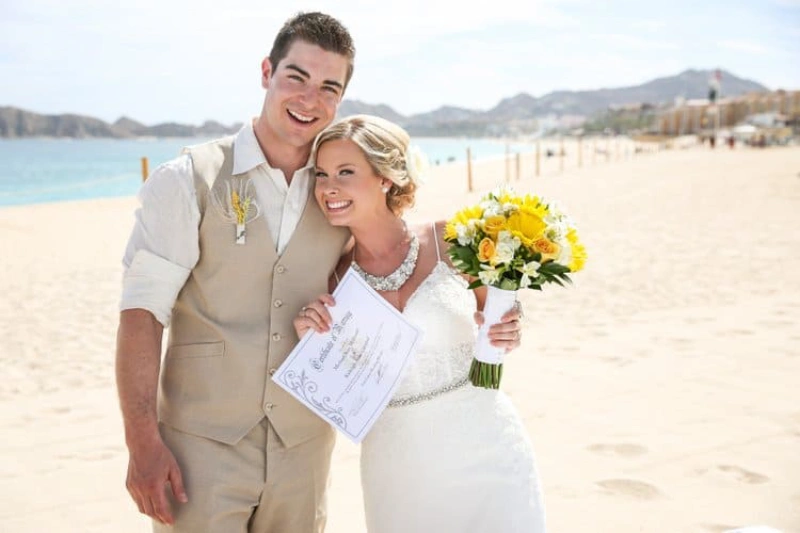Planning a destination wedding is an exciting prospect for many couples. However, amidst all the wedding preparations and excitement, it’s important not to overlook the legal requirements that come with tying the knot in a foreign country. Understanding and fulfilling these legal obligations is crucial to ensure that your dream destination wedding is legally recognized.
In this article, we will delve into everything you need to know about legal requirements for destination weddings. From obtaining the necessary documentation to understanding the specific legal procedures of your chosen destination, we will guide you through the process step by step.
Whether you’ve set your sights on a tropical beach wedding or a romantic European castle, each country has its own unique set of legal requirements that must be met. We will provide valuable insights and expert advice that will help you navigate through these legalities smoothly, allowing you to focus on celebrating your special day without any legal hiccups.
Join us as we uncover the legal ins and outs of destination weddings, ensuring that you are well-prepared to exchange your vows in the location of your dreams.
Legal requirements for destination weddings
Planning a destination wedding is a dream for many couples, offering the chance to exchange vows in breathtaking locations far from home. However, before diving into the details of choosing a venue or picking floral arrangements, it’s essential to understand the legal requirements involved in getting married abroad. Each country has its own set of laws governing marriage, and failing to adhere to these regulations can lead to complications that may overshadow your joyful occasion.
The legalities surrounding destination weddings can be complex and vary widely from one location to another. Some countries have more straightforward procedures, while others may require extensive documentation or waiting periods. Couples should familiarize themselves with these rules to ensure their marriage is recognized both locally and in their home countries. This understanding is crucial not only for peace of mind but also to avoid potential pitfalls that could arise from unfulfilled legal obligations.
In addition to understanding the marriage laws of the destination, couples should be aware of the implications these rules may have on their wedding plans. For instance, some locations may require a residency period, while others may have specific restrictions on who can officiate the ceremony. By preparing in advance and ensuring compliance with all legal requirements, couples can enjoy a seamless wedding experience while focusing on what matters most—their love and commitment to one another.
Researching the legal requirements for your chosen destination
The first step in planning a legally compliant destination wedding is thorough research into the legal requirements of your chosen location. Start by identifying the specific country and, if applicable, the region or city where you plan to marry. Each area may have different laws and regulations, so it is essential to gather accurate information. Official government websites, embassy resources, and reputable wedding planning blogs can provide valuable insight into the necessary steps and paperwork.
It’s also wise to consider the language barrier that may come into play when dealing with local authorities. If the destination is in a country where a different language is spoken, couples may want to seek assistance from bilingual friends or professional translators to ensure that they fully understand the legal requirements and can navigate the process without confusion. Miscommunication can lead to misunderstandings or delays, which can be easily avoided with a little preparation.
In addition to official resources, connecting with other couples who have gotten married in the same destination can provide practical tips and real-life experiences. Online forums, social media groups, or wedding planning apps can be excellent platforms for gathering insights from those who have navigated the same journey. These personal anecdotes can help you gain a clearer understanding of what to expect and what specific legal hurdles to prepare for in your destination wedding planning process.
Obtaining necessary documentation for a destination wedding
Once you have a grasp of the legal requirements, the next step involves gathering the necessary documentation to facilitate the marriage process in your chosen location. Commonly required documents include valid passports, birth certificates, and, in some cases, notarized affidavits affirming that you are free to marry. Each destination may have its unique list of required documents, so be sure to compile everything well in advance of your wedding date.
It’s also essential to check if any documents need to be translated into the local language or apostilled (a form of certification). Some countries require all foreign documents to be officially translated and notarized to be considered valid, which can add an additional layer of complexity to the process. Be sure to allow ample time for this step, as translation and notarization can take longer than anticipated, particularly if you are dealing with multiple documents.
Additionally, you may need to obtain a marriage license in advance of the ceremony. In some destinations, this license must be secured in person, while in others, it can be arranged through online applications. Understanding the timeline for obtaining these documents is crucial, as many countries have waiting periods or validity limits on marriage licenses. By staying organized and proactive in obtaining the required documentation, you can ensure that you are legally prepared to tie the knot in your dream location.
Hiring a wedding planner or legal expert for assistance
Navigating the legal landscape of a destination wedding can be daunting, which is why many couples opt to hire a local wedding planner or legal expert. These professionals often have extensive experience dealing with the specific legal requirements of their region and can help streamline the process, ensuring that all paperwork is completed accurately and submitted on time. A knowledgeable planner can also provide insights into local customs and traditions, which can enhance your wedding experience.
When choosing a wedding planner, look for someone who specializes in destination weddings and has a proven track record of successful events in your chosen location. Check reviews, ask for references, and inquire about their familiarity with the legal processes involved. A reputable planner will not only assist with logistics but will also be well-versed in the legalities of getting married in that destination, giving you peace of mind as you prepare for your big day.
In addition to wedding planners, couples may also consider consulting with legal experts or marriage officiants familiar with local laws. These professionals can provide invaluable assistance in ensuring that all legal aspects of your wedding are covered, from obtaining a marriage license to filing the necessary paperwork post-ceremony. By enlisting the help of local experts, you can alleviate stress and focus on enjoying the journey to your wedding day.
Understanding the marriage laws and regulations in your home country
Understanding the marriage laws and regulations in your home country is just as crucial as knowing the requirements of your destination. After your wedding abroad, you may need to take additional steps to ensure that your marriage is recognized legally back home. This may include registering your marriage with local authorities or obtaining an official translation of your foreign marriage certificate.
Each country has different processes for recognizing foreign marriages, so be sure to research what steps you need to take once you return home. In some cases, couples may need to provide evidence that they met the legal requirements of the destination where they were married. Failing to follow through with these obligations can lead to complications, particularly if you plan to change your name, apply for spousal benefits, or file taxes jointly.
It’s also essential to consider any potential implications for legal matters such as divorce or child custody should those situations arise in the future. Knowing how your marriage will be treated under your home country’s laws can provide clarity and assurance. By taking the time to understand both the local regulations of your wedding destination and the legal landscape of your home country, you can ensure that your marriage is recognized and protected.
Tips for navigating the legal process of a destination wedding
Successfully navigating the legal process of a destination wedding requires careful planning and organization. Start by creating a checklist of all the necessary steps and documents required for both the destination and your home country. This checklist will serve as a roadmap, helping you track your progress and ensuring that nothing is overlooked. Be sure to include deadlines for obtaining documents, making appointments, and submitting applications.
Staying in close communication with local authorities and professionals can also help you avoid potential roadblocks. If you are working with a wedding planner or legal expert, make sure to ask questions and clarify any uncertainties regarding the legal process. They can provide guidance and support, helping you navigate any complexities that may arise. Additionally, keep copies of all documents and correspondence related to your wedding, as having a paper trail can be incredibly helpful if any issues arise.
Finally, remain flexible and patient throughout the process. Legal requirements can change, and unexpected complications may arise. Embracing a positive attitude and being adaptable will allow you to handle any challenges that come your way. Remember, the ultimate goal is to celebrate your love and commitment, and a little extra effort in navigating the legalities will ensure that you can do so without any legal concerns.
Common legal requirements for popular wedding destinations
Different countries and regions have various legal requirements for couples planning to marry abroad. In popular wedding destinations such as Mexico, couples must provide a valid passport, tourist visa, and a marriage application to the local civil registry. Additionally, documents such as birth certificates and proof of dissolution of any previous marriages (if applicable) may be required. It’s also vital to note that many locations in Mexico require at least one witness to be present during the ceremony.
In contrast, countries like Italy have specific requirements for foreign couples wishing to marry. Couples typically need to provide a Nulla Osta (a declaration of no impediment to marriage), which can be obtained from their home country’s consulate. Furthermore, documents may require translation into Italian, along with a legalization process. It’s essential to start this process early, as obtaining these documents can take time and may require multiple appointments.
In the Caribbean, the rules can vary significantly from one island to another. For instance, in the Bahamas, couples must present a marriage license application, valid ID, and proof of arrival in the country. There may also be a waiting period before the ceremony can take place. Understanding these specific legal requirements is crucial for ensuring that your wedding day goes smoothly, and that your marriage is recognized both locally and back home.
Additional considerations for same-sex destination weddings
Same-sex couples planning a destination wedding should be aware of the varying legal recognition of their unions in different countries. While many nations have made significant strides toward accepting same-sex marriage, others may have laws that do not recognize such unions or may impose restrictions. Couples should thoroughly research the legal stance on same-sex marriage in their chosen destination to ensure that their marriage will be legally acknowledged.
In some countries, same-sex couples may only be able to hold a symbolic ceremony without legal recognition. In such cases, couples might want to consider having a civil ceremony in their home country before traveling, which can provide legal protection and recognition. This approach allows couples to celebrate their love in a destination that may not fully recognize their union while ensuring that their marriage is legally valid in their home jurisdiction.
Additionally, same-sex couples should take into account the cultural attitudes toward LGBTQ+ individuals in the destination country. Understanding the local customs and societal norms can help couples navigate their wedding plans more effectively and avoid potentially uncomfortable situations. By being informed and prepared, same-sex couples can enjoy a beautiful destination wedding while ensuring their legal rights are protected.
Conclusion: Ensuring a smooth and legally compliant destination wedding
Planning a destination wedding can be a thrilling adventure filled with romance and excitement. However, navigating the legal requirements is a crucial aspect that cannot be overlooked. By conducting thorough research, obtaining the necessary documentation, and enlisting the help of local experts, couples can ensure that their wedding day is legally compliant and stress-free.
Understanding both the legal requirements of the destination and the regulations of the home country is essential for a smooth experience. Staying organized, maintaining open communication, and remaining flexible throughout the process will help couples manage any challenges that may arise.
Ultimately, the goal is to celebrate love and commitment in a breathtaking setting, and by taking the time to address the legalities, couples can fully immerse themselves in the joy of their destination wedding. With adequate preparation and a positive mindset, your dream wedding will undoubtedly become a beautiful reality.





